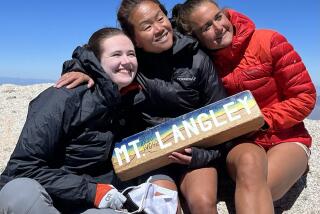Blind Sailors Find All They Need Is ‘Feel of the Wind’
- Share via
BOSTON — Jeff Pitman is blind, but he sails for the same reasons sighted people do: fresh air, warm sunshine and the feel of the wind at his back.
“You don’t need eyes to sail,” he says, “as long as you can feel the wind and know where it’s going to take you.”
Pitman’s not just optimistic. Sighted volunteers who accompany blind sailors in a program held at marinas in the Charlestown and South Boston sections of Boston corroborate his claims.
“I’ve learned more from them, I haven’t taught them a thing,” said Harry McDonough, 68, a former champion sailor whose Courageous Sailing Center sponsors the 10-year-old program with the Carroll Center for the Blind in Newton. It is believed to be the only organized sailing program for the blind in the country.
Blindfolded Lessons
McDonough was inspired to help teach the blind to sail as a result of his own experiences learning to sail. At age 4, he said, his father taught him to sail blindfolded so he would learn to better sense the wind and gain balance.
“It’s more about feel and balance than sight,” McDonough said on a recent Saturday while he motored around Boston Harbor checking on the blind sailors. “I always said that someday I’d teach the blind to sail--and it works.”
“When you sail, you sail in relation to the wind,” said volunteer guide John Trickett, 29. “All the key factors about sailing have nothing to do with sight.”
Visually impaired people from all over New England participate in the sailing program. The cost is $1 per season. Most have never been on a small boat when they step gingerly onto the vessels.
‘I Just Enjoy It’
“When I first went out I was a little scared the whole boat was going to tip over with me in it,” said Gil Busch. “But now I don’t have that feeling anymore. I just enjoy it.”
Rose Prescott, 41, a rehabilitation counselor who has been blind since age 5, and Melinda Conrad, 41, who is legally blind, travel by bus from Concord, N.H., every weekend to sail.
“We may not beat anyone else out here but we have fun,” said Conrad. “Our friends think we’re a little crazy but then they know that we’ll try anything. We go cross-country skiing, we went to Jamaica and London. We like being outdoors.”
Prescott said she was a little fearful at first.
“All they say out here is ‘Rose!’--to let me know I should do something,” said Prescott. “I kind of fill in the blanks and figure out what should be done.”
Guides Provide Warnings
Volunteers sail in boats with the blind sailors, teaching novices how to trim the sails, how to tack and reminding them not to try to sail against the wind. For those with some experience, the guides are there merely to tell the blind sailors if other boats are coming or if they are too near shore.
“To be a good sailor you need to be in harmony with the wind and the waves and the boat,” said Arthur O’Neill, who directs the program for the Carroll Center.
Heather Schroder, 27, a volunteer guide, said she was doubtful that the blind could sail when she heard about the program. But she was soon convinced.
“It doesn’t matter whether you’re blind or not,” she said. “You just need a good instructor.”
Sail Every Saturday
The blind sailors sail every Saturday either at the Courageous Sailing Center at the Charlestown Navy Yard or in the protected waters of Pleasure Bay off Castle Island in South Boston.
At the end of the summer, they participate in a special regatta. The rules are simple: One sighted volunteer accompanies each blind sailor in a boat but the volunteer is not allowed to touch anything during the race. He or she is allowed only to warn of hazards.
“This isn’t going to make them to be Olympic sailors,” said McDonough. “We’re just teaching them something to love that they otherwise would never get a chance to do.”
More to Read
Sign up for The Wild
We’ll help you find the best places to hike, bike and run, as well as the perfect silent spots for meditation and yoga.
You may occasionally receive promotional content from the Los Angeles Times.






